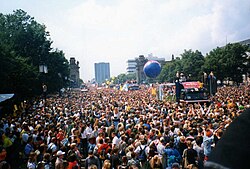Germany’s Techno Parade, known as the Love Parade in its heyday, is more than just a music festival; it’s a cultural phenomenon that has shaped the electronic music scene and left an indelible mark on Berlin and Germany as a whole. From its humble beginnings as a small gathering of music enthusiasts to its peak as a massive celebration drawing millions, the Techno Parade’s story is one of evolution, innovation, and, ultimately, tragedy. This article delves into the history, impact, and legacy of this iconic event.
The Birth of the Love Parade
The Vision of Dr. Motte
The Love Parade was founded in 1989 by Matthias Roeingh, better known as Dr. Motte, and his then-girlfriend Danielle de Picciotto. Their initial vision was a political demonstration for “peace, joy, and pancakes,” using techno music as the driving force. Pancakes, huh? Sounds like a pretty sweet deal to me!
Early Years and Growth
The first Love Parade was a relatively small affair, with only around 150 people participating. However, the event quickly gained popularity, attracting increasingly larger crowds year after year, drawn in by the unique atmosphere and the burgeoning techno scene. Imagine being at that first one. Talk about being in on the ground floor of something big!
The Love Parade’s Rise to Prominence
Global Phenomenon
By the mid-1990s, the Love Parade had become a global phenomenon, attracting millions of ravers from all over the world. The event transformed Berlin into a massive open-air nightclub, with floats blasting electronic music and people dancing in the streets. I remember seeing pictures – it looked absolutely wild! Did anyone ever actually sleep during those weekends?
The Music and Culture
The Love Parade was more than just a music festival; it was a celebration of techno culture. The event fostered a sense of community and freedom, attracting people from all walks of life who shared a love for electronic music. You know, that’s the kind of vibe you just don’t get everywhere. It felt like… everyone belonged.
Controversies and Challenges
Criticism and Opposition
Despite its popularity, the Love Parade also faced criticism and opposition. Concerns were raised about noise pollution, waste management, and the impact on the environment. The event also attracted unwanted attention from drug dealers and other criminal elements. I mean, it’s a party, right? Gotta expect some… complications.
Financial Difficulties
As the event grew larger, it also became increasingly expensive to organize. Financial difficulties eventually led to the Love Parade being cancelled in 2006. Money always spoils the fun, doesn’t it?
The Tragedy of 2010
Duisburg Disaster
In 2010, the Love Parade was held in Duisburg, Germany. The event turned into a tragedy when a massive crowd crush occurred at the entrance to the festival grounds, resulting in the deaths of 21 people and injuring hundreds more. It’s… it’s just heartbreaking, thinking about that.
Aftermath and Legacy
The Duisburg disaster led to widespread condemnation of the event organizers and the authorities responsible for safety. The Love Parade was permanently cancelled in the wake of the tragedy. The event serves as a sobering reminder of the importance of safety and crowd control at large-scale events, and the legacy of the victims remains a poignant part of the cultural memory. It’s a reminder that fun has to be balanced with responsibility, you know?
The Lasting Impact
Influence on Electronic Music
The Love Parade played a significant role in popularizing techno music and shaping the electronic music scene. The event helped to introduce electronic music to a wider audience and inspired countless artists and DJs. It’s hard to imagine the electronic music landscape without its influence.
Cultural Significance
The Love Parade had a profound impact on German culture, particularly in Berlin. The event symbolized the city’s newfound freedom and its embrace of creativity and innovation. While the original event is no more, its spirit continues to resonate within the techno community and the broader cultural landscape. It really helped define Berlin for a generation, didn’t it?
So, what do you think about the whole story of Germany’s Techno Parade? From its crazy beginnings to its tragic end, it’s definitely left its mark, that’s for sure. Maybe it’s a good time to dig out some old techno tracks and remember those days, or even share your own stories if you were part of it!
 Cloudabouts
Cloudabouts




